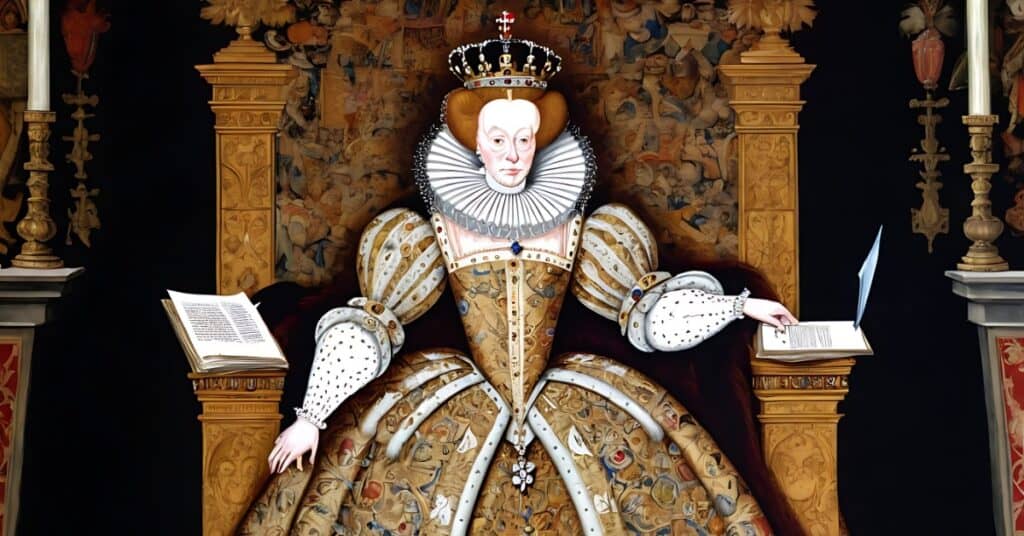Elizabethan England was a period in English history during the reign of Queen Elizabeth I. It lasted from 1558 to 1603. The era was known for its flourishing arts, exploration, and growth of English literature. Shakespeare was a prominent figure during this time.
Elizabethan England was a time of cultural richness and expansion. The period was marked by great achievements in various fields, making it a significant chapter in English history.
Summary List
- Elizabethan England was ruled by Queen Elizabeth I from 1558 to 1603.
- It was a time of great cultural flourishing, known as the Elizabethan Era.
- William Shakespeare was a prominent playwright during this time, writing many famous plays.
- Exploration and trade expanded during this period, with famous explorers like Sir Francis Drake.
- Religion played a significant role, with tensions between Catholics and Protestants.
Games and Apps
Learning Modules
Elizabethan Court
Step into the opulent world of the Elizabethan Court, where intrigue, scandal, and power play out against a backdrop of lavish banquets and elaborate masquerade balls. With ambitious nobles vying for the queen's favor and dark secrets lurking behind every gilded tapestry, court life is anything but dull.
I Want To Learn This!Act of Supremacy 1559
The Act of Supremacy 1559 was a pivotal moment in English history, solidifying Queen Elizabeth I's authority over the Church of England. By declaring her as the supreme governor of the church, Elizabeth successfully navigated the religious turmoil of the time and established herself as a powerful leader.
I Want To Learn This!Act of Uniformity 1563
The Act of Uniformity 1563 was a statute passed in England during the reign of Queen Elizabeth I. It required all public worship to adhere to the Book of Common Prayer and imposed penalties on those who did not comply. This act played a significant role in shaping the religious landscape of England at the time.
I Want To Learn This!The Spanish Armada 1588
In 1588, the Spanish Armada set sail with the intention of invading England and overthrowing Queen Elizabeth I. However, their plans were thwarted by a combination of English naval prowess, strategic maneuvering, and unfavorable weather conditions. This historic battle would go on to shape the course of European history.
I Want To Learn This!Elizabeth’s first Parliament session (January 25, 1559)
As Elizabeth I enters her first Parliament session on January 25, 1559, tensions run high as she navigates the political landscape of a divided nation. With her sharp wit and cunning diplomacy, Elizabeth must assert her authority as England's new queen and solidify her position on the throne.
I Want To Learn This!Elizabeth’s excommunication by Pope Pius V (February 25, 1570)
Elizabeth I of England was excommunicated by Pope Pius V on February 25, 1570, due to her support of Protestantism. This decree marked a significant turning point in the religious and political landscape of Europe, as Elizabeth's defiance of the Catholic Church solidified her position as a key figure in the Protestant Reformation.
I Want To Learn This!Execution of Mary, Queen of Scots (February 8, 1587)
On February 8, 1587, Mary, Queen of Scots, was executed by beheading at Fotheringhay Castle in England. Accused of plotting against her cousin, Queen Elizabeth I, Mary's death marked the end of a tumultuous reign filled with political intrigue and religious conflict. Her execution remains a controversial and tragic event in history.
I Want To Learn This!Drake’s circumnavigation of the globe (1577-1580)
Embark on a thrilling adventure with Drake as he becomes the first Englishman to successfully navigate the globe from 1577 to 1580. Follow his daring exploits, encounters with hostile natives, and battles with Spanish ships in this epic journey that will leave you on the edge of your seat.
I Want To Learn This!Publication of the “Book of Common Prayer” (1559)
The publication of the "Book of Common Prayer" in 1559 marked a significant moment in English religious history. This revised edition, under the reign of Queen Elizabeth I, sought to establish a standard form of worship for the Church of England. Its enduring influence can still be felt in Anglican liturgy today.
I Want To Learn This!The Elizabethan Poor Law (1601)
The Elizabethan Poor Law of 1601 was a groundbreaking legislation that established a system of poor relief in England. It required each parish to care for its own poor, ensuring that those in need would receive food, shelter, and medical care. This law marked a significant step towards social welfare reform in England.
I Want To Learn This!The execution of Essex (February 25, 1601)
On February 25, 1601, Robert Devereux, the 2nd Earl of Essex, was executed for his role in a failed rebellion against Queen Elizabeth I. Despite once being a favorite of the queen, Essex's downfall serves as a cautionary tale of power, ambition, and the consequences of betraying the crown.
I Want To Learn This!The Treaty of Nonsuch with the Dutch Republic (1585)
The Treaty of Nonsuch, signed in 1585, solidified the alliance between England and the Dutch Republic against the Spanish Empire. This pivotal agreement marked a turning point in the Eighty Years' War and laid the foundation for future cooperation between the two nations in their fight for independence.
I Want To Learn This!The Elizabethan Religious Settlement (1559)
The Elizabethan Religious Settlement of 1559 was a pivotal moment in English history, marking Queen Elizabeth I's establishment of the Church of England as the official state religion. This settlement sought to strike a balance between Protestant and Catholic beliefs, shaping the religious landscape of England for centuries to come.
I Want To Learn This!












